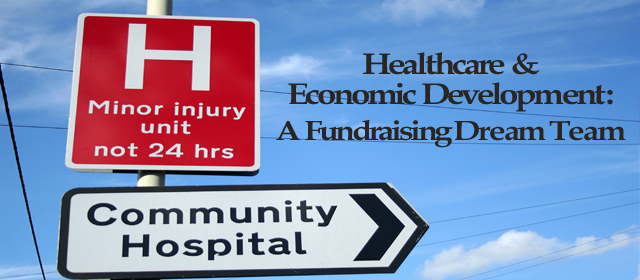At first glance, hospitals and economic development may not seem to go hand-in-hand, but they are actually an incredibly powerful pairing. Economic development organizations (EDOs) want to ensure the availability of convenient, quality healthcare within their community because it is attractive to employers. In fact, it’s routinely one of the top three relocation requirements that established employers have. On the flip side of that coin are the hospitals themselves, who benefit from having a plethora of strong local employers providing healthcare coverage to their employees because it helps to strengthen their available payer mix, and therefore their bottom line.
In recent years, we have seen a growing trend of hospital executives working closely with their local EDOs to both develop long-term, strategic initiatives and to raise the funding needed to successfully implement them. Twenty or so years ago this wasn’t the case. Then, the key players typically stepping up to assist in economic development activities were major employers, utilities companies, and newspapers. While major employers and utilities companies still play an active role in today’s economic development landscape, hospitals are very clearly emerging as the new third power player, and it’s a trend we believe is only going to continue to grow.
Let’s take a quick look at all of the ways hospitals are impacted by their local economy:
- Hospitals receive their revenue from a combination of insurance (government or commercial) and self-pay care, but they are also legally required to provide charity-care, especially those hospitals with nonprofit status.
- Hospitals need to have a strong “payer mix,” and the more commercial insurance they have in their payer mix, the more revenue they make.
- The more industry a community has, the more commercially insured individuals they will have in their payer mix.
- When a hospital’s payer mix does not have a sufficient number of commercially insured individuals, it cuts in to their bottom line and can negatively impact both profit and productivity in the ER.
- Many hospitals are also heavily involved in real estate, so land use development is helpful to them.
- Having a strong economy and business community increases their potential donor base for their own philanthropic efforts.
- When their local community has a high quality of life, it helps the hospital to attract a better workforce for themselves.
Given all of the above, it makes complete sense that hospital executives should take an active and high-profile role in supporting economic development. In fact, we are now routinely seeing hospitals executives that not only sit on the boards of their local EDOs, but they are chairing those organization’s capital campaigns. This allows the hospital to have a strong voice in the development of the strategic initiatives that will impact their hospital in so many ways, and it also helps to lend a lot of credibility and, potentially, financial support to the EDOs’ campaigns. Best of all, the EDOs welcome this support and involvement. Quality EDOs do not create strategic initiatives in a vacuum; instead, they go out looking for the feedback and insights of community leaders in order to develop a plan that will benefit the community as a whole, and hospital leaders definitely fit this bill.
So, if you are a hospital executive who is not currently involved in your local EDO, go out and learn how you can get involved. If you are an EDO executive who has never thought to ask the executive of your local hospital(s) to get more involved, now is the perfect time to do so. And, if you have asked your local executive(s) to become more involved and have been denied, don’t be afraid to try again!






